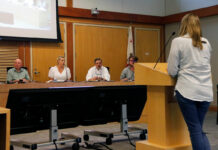Thirty percent of the world’s population lacks adequate access to safe water and a child dies every 90 seconds on our planet from a water-related disease. Many schools and hospitals in underdeveloped countries lack safe drinking water or sanitation.
It is statistics like these and the disease, poverty and wretched living conditions they depict that has led the United Nations to celebrate World Water Day every March 22. Since 1992, a single day has been devoted to global education on the scarcity of water in vast parts of the globe. Besides poverty and disease, past year’s programs have focused on sustainable development, water and energy, food scarcity, water and war and the role of women and children.
Here in Sonoma County, we seem to pride ourselves on “thinking globally.” When it comes to water, we do even better than that. We are home to dozens of water activist groups. Local church congregations, Rotary clubs, wineries and others are actively engaged in programs that have developed clean water resources in the most impoverished regions of the planet.
At this very moment, there is a team of Sebastopol Rotarians completing a working tour of rural villages in Uganda, checking on the water projects, school construction and sustainable farming projects called Adopt-A-Village.
Two weeks ago, Dry Creek Valley’s retired winery owner Dave Stare hosted a contingent from Kenya as part of the Vineyards to Villages water projects under the umbrella of the local Global Partners for Development.
These efforts, along with other outreach campaigns and local church missions, are based on the understanding that access to clean water is the single most important anti-poverty and anti-disease tool. Today, 2.5 billion people do not have this basic life ingredient. More people have cell phones than have a toilet in today’s world. In many places, the primary task of children and women is to carry water from distant sources, often 2-4 miles each way.
It seems these global statistics are fairly well known here. It looks like World Water Day is a big deal to many Sonoma Countians.
That’s good, because it could be very easy for all of us here to take clean and ample water supplies for granted. Our North Coast and Russian River watershed is one of the most verdant and fertile habitats on any of Earth’s continents. Our agriculture industry, our very contented lifestyle and our overall economy continue to benefit and thrive.
We are surviving a historic drought where we barely noticed any changes in our very affluent lifestyles while we reduced our water consumption by 17 to 20 percent. We can’t share any excesses of water here, but we are doing a great job of sharing our knowledge and philanthropy where it is saving lives and building hope and sustenance where there has been none.
Sonoma County’s and California’s water troubles are all political, not life-threatening. In our Russian River watershed, we have been arguing about competing water uses between cities and farms — and how much we need to save for the fish. Drought or no drought, we must continue to improve our conservation practices and reduce our municipal and industrial thirsts.
As Californians, we may soon be asked again to vote on a $15.7 billion water diversion project. This is a “north versus south” California water fight. It does not involve our North Coast water resources but it will be our taxes that help pay for it. A 35-mile dual tunnel would divert northern Sierra snowmelt and Sacramento River flows to irrigate southern San Joaquin crops and cities as far south as San Diego.
This is a very different public policy question than the ones raised by the U.N.’s agenda for World Water Day. One is about watering almond orchards and the other is about saving lives. Both are important.
— Rollie Atkinson








